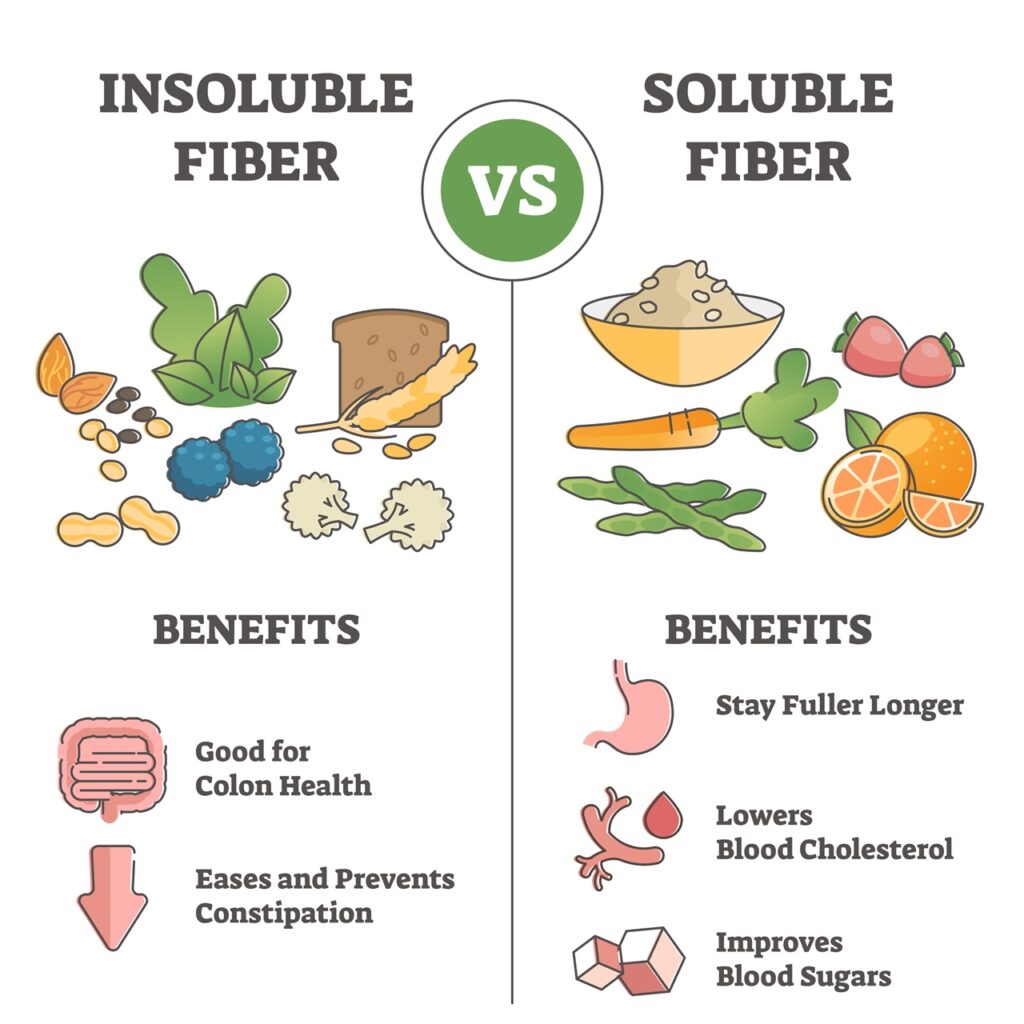
“Eat more fiber”- it is something that all of us have heard at some point in our lives. But do you know why consuming fiber is beneficial for your health?
Found mostly in fruits, vegetables, legumes and whole grains, dietary fiber is popular for relieving and preventing constipation. Along with this, it has various other benefits like lowering the risk of diabetes, helping in maintaining a healthy weight, lowering risk of heart diseases, etc.
It may sound like eating fiber-rich food may be boring but it is not true. There is a huge variety of food items that contain fiber which makes it easy for you to pick and choose as per your preferences.
In this blog, we have not only mentioned sources of fiber but also dietary fibers benefits.
Let’s discuss what dietary fiber is all about.
What Is Dietary Fiber?
Also known as roughage, dietary fiber includes part of plant food that your body can neither absorb nor digest. Unlike fats, carbohydrates or proteins, fiber is not digested by your body, instead it passes out of your body through your stomach, small intestine and colon.
There are two kinds of fibers:
- Soluble fiber
- Insoluble fiber
What Is Soluble Fiber?
Soluble fiber can dissolve in water and form a gel-like substance. This type of fiber helps to lower glucose and blood cholesterol levels. Some soluble fiber foods are peas, oats, apples, beans, citrus fruits, barley, carrots, etc.
If you want to buy any of the above mentioned fruits and vegetables, you can visit OLX Pakistan’s website.

What Is Insoluble Fiber?
Insoluble fiber improves stool bulk and aids the movement of material through your digestive system. This type of fiber is beneficial for people suffering from irregular stools or constipation.
Some good sources of insoluble fiber are wheat barn, whole-wheat flour, beans, nuts and vegetables, like green beans, potatoes and cauliflowers.
Since each food item has different amounts of soluble and insoluble fiber, it is essential that you include as many in your diet as possible.
Now that we know about the different types of fiber, let’s see how beneficial it is for our body.
Benefits of Dietary Fiber
Following are some of the benefits of consuming dietary fiber:
Protection Against Heart Diseases
High-fiber foods reduce blood pressure and prevent cardiovascular diseases.
In 2017, a review of studies was published in the Journal of Chiropractic Medicine, which showed that people who had high-fiber diets had lower chances of developing cardiovascular diseases.
The authors of the reviewed studies were of the opinion that this may be because fiber reduces total cholesterol and low-density lipoprotein (LDL) cholesterol which pose a huge risk to your heart.
Helps in Achieving Healthy Weight
As compared to other food items, high-fiber foods are more filling. This means you are likely to eat less and enjoy the feeling of fullness for a longer period of time. They are also less energy dense which means they have fewer calories for an equal amount of any other food item.

Better Gut Health
Fiber plays an essential role in keeping the gut healthy. Eating an adequate amount of fiber helps waste to move out of your body smoothly and it also prevents and relieves constipation. Fiber promotes healthy gut microbiota as well.
According to a study published in the Journal of the Academy of Nutrition and Dietetics, dietary fiber promotes regular bowel movements, increases bulk of stool and reduces the time waste remains inside the intestines.
Controls Blood Sugar Levels
High-fiber diet, specifically soluble fiber, is extremely beneficial for people who are suffering from diabetes. It is responsible for slowing down the absorption of sugar and improving blood sugar levels.
Along with this, any food items that have insoluble fiber decreases the risk of getting Type 2 diabetes.

How Much Fiber Do You Need?
The Institute of Medicine has the following daily fiber intake recommendations for adults:
Men:
Age 50 or below: 38 grams
Age 51 or above: 30 grams
Women:
Age 50 or below: 25 grams
Age 51 or above: 21 grams
How to Get Your Daily Dose of Fiber?
As mentioned earlier, there are various food items that you can consume to increase your daily fiber intake. Plant-based food items are a great source of dietary fiber.

According to the Dietary Guidelines for Americans 2015-2020, following are some sources of food with fiber content:
- High fiber bran (ready-to-cook cereals)
- Cooked chickpeas
- Cooked black beans
- Cooked lentils
- Canned white beans
- Kidney beans
- Raw pear
- Baked beans (canned or plain)
- Avocado
- Mixed vegetables
- Sweet potatoes
- Raspberries
- Black berries
- Cooked Quinoa
- Dry roasted pistachios
We hope this guide was helpful and will make it easy for you to add dietary fiber to your diet. Do let us know which food items you prefer the most for your daily fiber intake.








Leave a Reply